Champions of Change Blog
Rebuilding Our Food Traditions
Posted by on September 11, 2012 at 11:00 AM EDT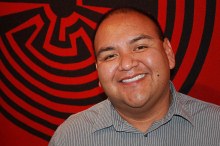 Terrol Johnson is being honored as a Champion of Change for strengthening food security.
Terrol Johnson is being honored as a Champion of Change for strengthening food security.
Like so many communities across the country, Native Americans are suffering from a lack of access to healthy, affordable and culturally-appropriate foods. Malnutrition can be devastating to the health of Native American communities where the problem of hunger is not that we do not get enough food; rather we get the wrong foods.
Among the members of my own tribe, the Tohono O’odham of southern Arizona, the loss of an agricultural economy and a traditional diet has meant an epidemic of Type 2 Diabetes. In 1960, no tribal member had ever suffered from the disease; today, more than half of adults – and children as young as seven-years-old – have Diabetes, the highest rates in the world. My tribe is not alone. Native Americans suffer from a rate nearly three times the national average. However, the rest of the country is quickly catching up; diabetes and childhood obesity rates are skyrocketing nationally.
Behind these statistics is real human suffering. I have seen my own grandfather, aunts and sister all die due to complications of Diabetes. And I too have the disease.
Learn more about Additional IssuesEmpowering a New Generation of Farmers at Home and Abroad
Posted by on September 11, 2012 at 10:57 AM EDT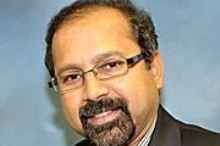 Dr. Govind Kannan is being honored as a Champion of Change for strengthening food security.
Dr. Govind Kannan is being honored as a Champion of Change for strengthening food security.
Through a community outreach program during the second year of my veterinary medical studies at the Madras Veterinary College in India, I developed a keen interest in helping rural farmers in need of technical support to improve the sustainability of their animal agricultural enterprises. During a subsequent Master’s Program in Veterinary Science, through my focus on meat hygiene, I appreciated the importance of a nutritious diet on human health and its effect on the learning abilities of children and the earning potential of adults. The negative impact of malnutrition and lack of clean water on rural, low-income communities was eye-opening to me.
After completing my PhD degree and while pursuing an academic career in the United States, a different kind of challenge facing global food security became apparent to me. Young people are shying away from careers in agriculture, even in families that have been involved in farming for generations. According to the U.S. Department of Agriculture (USDA), the average age of an American farmer in 1945 was 39, while the average age of today’s farmers is about 58. In agricultural disciplines, the number of graduates produced nationally is low, particularly for minority students and this is a serious concern. Future students of agriculture have the awesome responsibility of increasing food production to meet the demands of a growing world population while integrating production, socioeconomic, cultural, and environmental objectives to promote agricultural sustainability.
One More Mountain to Climb
Posted by on September 11, 2012 at 10:50 AM EDT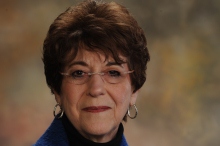 Dr. June Henton is being honored as a Champion of Change for strengthening food security.
Dr. June Henton is being honored as a Champion of Change for strengthening food security.
Who would believe that after more than 25 years as a Human Sciences dean at Auburn University that I could still be inspired by one more mountain to climb? In December of 2003, I found myself inspired to take on one of the biggest challenges the world faces still today - how to work towards solving the problem of hunger on a global scale. It all came about when a friend who was consulting with the UN World Food Programme (WFP) asked if I we might be interested in working with them on a Student War on Hunger Campaign being developed by WFP.
On a personal level, my colleagues and I were very concerned about world hunger, but we knew that a personal passion for the issue was not enough. The partnership with WFP came about out of a university task force on sustainability. As students at the meeting talked about sustainability, they seemed to know all about environmental issues – global warming, green buildings, climate change, and recycling. But I heard nothing about the human issues affecting sustainability, such as hunger and poverty, education and healthcare, overpopulation, and access to markets. So we started “Auburn’s War on Hunger,” which opened up that dialogue, framing hunger as a critical sustainability issue and launching a higher education movement that has subsequently spread throughout the world under the banner of Universities Fighting World Hunger (UFWH).
Learn more about Additional IssuesA Nobel Prize for Food and Agriculture
Posted by on September 11, 2012 at 10:41 AM EDT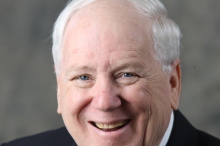 Former Ambassador Kenneth M Quinn is being honored as a Champion of Change for strengthening food security.
Former Ambassador Kenneth M Quinn is being honored as a Champion of Change for strengthening food security.
For the past 12 years, it has been my privilege to build upon the legacy of one of the single greatest "champions of change" that the world has ever known --Dr. Norman E. Borlaug. Known as the man who saved more lives than anyone who has ever lived, Dr. Borlaug passed away in 2009. His work to confront global hunger carries on through the World Food Prize Foundation that he founded and I lead.
Born on a farm in northeast Iowa in 1914, Norman Borlaug became a plant pathologist who, while working among the poorest farmers in Mexico in the 1940s and 50s, developed a new "miracle wheat" which was able to resist disease and triple the yield. In the 1960s, he went to India and Pakistan, which were facing imminent mass starvation, and convinced the leaders of both countries to adopt his new approach to agriculture using the new seeds that he had developed. In just five years both countries went from facing extreme deprivation to self-sufficiency and even surpluses. Hundreds of millions of lives were saved, which led to his being awarded the Nobel Peace Prize in 1970 and given the appellation the father of the green revolution.
Bringing Fresh and Healthy Food to East Lake
Posted by on September 11, 2012 at 10:31 AM EDT Rev. Sally Allocca is being honored as a Champion of Change for strengthening food security.
Rev. Sally Allocca is being honored as a Champion of Change for strengthening food security.
In my 20 years in the East Lake neighborhood of Birmingham, Alabama, I have had the opportunity to talk to seniors and others in the area about childhood memories of a vibrant, living community: walks to the corner drugstore, fresh food at local markets, movies at the area theatre, and boat rides on the lake in the park. As a late comer to this neighborhood, my experience began with loss of infrastructure- churches and stores moving to greener pastures, burned out houses, and a reputation of crime, drugs, and blight. Churches that remained in the area and various social service agencies sought answers and resources, but were met with a lack of funds, aging congregations, and constituents moving out of the changing, declining neighborhood. The neighborhood faced a 25% poverty rate, mounting crime, and an extremely negative public perception.
Eight years ago, a group of committed neighborhood and church volunteers and I dreamed up Promoting Empowerment and Enrichment Resources (P.E.E.R., Inc.), an organization defined by its name to work with, and not simply on behalf of those in our community. This group began the uphill climb of seeking funds, gathering resources and information, and listening to the voices of the people in the neighborhood. We struggled to find our niche, initially helping people do their taxes, hosting health fairs, and coordinating an after-school program. But soon, we settled on health initiatives specifically in the area of access to fresh, healthy food. We figured, EVERYBODY EATS, so this would be a way to connect everyone to a common goal and resource.
Learn more about Education, Additional IssuesCommunity Development in the Classroom
Posted by on September 5, 2012 at 5:38 PM EDT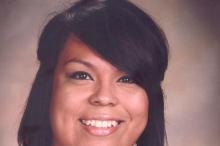 Selina Alonzo is being honored as a Champion of Change for her service to education.
Selina Alonzo is being honored as a Champion of Change for her service to education.
I figured out early in my teaching career that my students would allow me to educate their minds if I first taught their hearts. Love changes people, it moves them and it inspires them. I am honored to be a White House Champion of Change because I believe that change, true and deep, happens after individuals have an experience with love, and so I am dedicated to showing the students on the Westside of Phoenix how worthy they are of love. I will champion this cause for the rest of my life.
As a Christian, I am called to live out the principles outlined in the Bible. Micah 6:8 tells us to do justice, to love kindness and to walk humbly with God. When I read this its essence resonated intensely within me. It was enough to become my life’s basis, but I had no clue how this would play out in a high school English classroom. I began to doubt the career path I had chosen, so I pursued other options. I was still in college, and still had a profound desire to teach, but the call in Micah 6:8 ignited a desire to seek change for the community that had raised me. The injustice and cruelty that was present in my neighborhood catapulted me into working to see justice reign and kindness prevail. I wanted change for my community. This new trajectory, this passion to see lasting and systemic transformation led me to work for Neighborhood Ministries, Inc. in 2003.
During my time on staff with Neighborhood, I was asked to read a book called With Justice for All by Dr. John Perkins. I encountered a new way to love my community when I read this book. I saw a new framework by which to approach my work and my life. Dr. Perkins ascertains that there are three R’s to community development. The first is relocation. Relocation means that you become one with the community you are serving. This was easy for me because I was already there. I didn’t have to move one block to live in a community of need. Living within a community brings solidarity and creates family. The second “R” stands for reconciliation. Working for reconciliation means that you fight to break oppressive cycles, close achievement gaps, it means that you live Micah 6:8 - seeking justice and teaching kindness. Reconciliation brings the community together allowing each member to work out the existing problems as a combined force of like-hearted people. The last R is for redistribution. The goal of redistribution is empowerment. The community can learn how to come together and use their shared resources of skills, education, and experiences and redistribute them within their group to strengthen it. I made a commitment then that I would always live, work and serve in a community of need.
I graduated from college a year later. I took a teaching position at Maryvale High School. In the beginning I saw my employment at this urban school as an opportunity to continue my call. It was difficult at first; I wasn’t quite sure how Micah 6:8, grammar and Shakespeare would work together. I saw that my students weren’t responding the way my college textbooks told me they would. My students weren’t achieving the way I thought was consequence to long hours, heavy grading and careful lesson planning. People around me faulted the elementary schools, administration, parents, language barriers, poverty, politics and lack of resources. The blame list seemed endless, but I couldn’t reconcile myself to believe a Smart Board or newer textbooks would solve my classroom issues. Things were broken and that was evident, but my faith reminded me there was a God that came to fix the broken. God fixes the broken with love. I found I needed to implement a plan rooted in love. God had given all believers a model of how to love in Micah 6:8, and He had given Dr. Perkins a love strategy for implementing change in communities, and He had given me a classroom.
In my classroom I had to figure out how to love my students into learning, so I used the same model outlined by Dr. Perkins. Each period of the day students and I are “relocated” to Room 103 and become a family. We work hard to “reconcile” our differences and challenges early in the year, so that we can focus and solve the issues that get in the way of our learning. We take what we have learned together and we “redistribute” it within the classroom showing our learning and solidifying it. We see the empowerment education brings. My students do all the work. I am so proud of them. They are more than the pride of the Westside; they are the real champions of change.
Selina Alonzo is an English teacher at Maryvale High School in Phoenix, Arizona
- &lsaquo previous
- …
- 91
- 92
- 93
- 94
- 95
- 96
- 97
- 98
- 99
- …
- next &rsaquo

